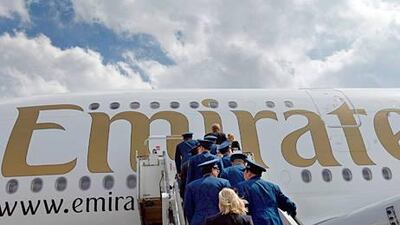Emirates Airline raised US$4.62 billion (Dh16.96bn) in aircraft financing over the past two years, helping it weather the tight lending conditions of the global downturn.
The Dubai airline lined up credit to finance 30 wide-body aircraft delivered during the period, it said.
Emirates and other Middle East carriers are becoming major players in international capital markets after ordering a total of more than 300 aircraft since 2007, with deliveries scheduled throughout the next 10 years.
Emirates recently disclosed it would need more than $28bn to finance its deliveries of Boeing and Airbus aircraft through 2017, almost twice the amount it had raised since 1996. Etihad Airways, which plans to almost triple its fleet within 10 years, will require $13.3bn from financial institutions, it said recently. "Over the next 10 years, there are large financing and treasury opportunities," James Rigney, the carrier's chief financial officer, told bankers last month in London.
Last year, Emirates lined up funding for its deliveries of eight Airbus A380 superjumbos. In addition, it received three ultra-long-haul Boeing 777-300ERs, it said.
Saj Ahmad, an analyst at FBE Aerospace in London, said Emirates Airline's wide-body aircraft were easier to finance.
"Emirates has been able to raise so much money in airplane financing [because] its entire fleet is exclusively all wide-bodied - these nearly always command good residual prices and hold value for much longer than narrow-body airplanes," he said.
In 2009, Emirates' financing requirements led it to raise $2.7bn to take delivery of 19 new aircraft, the airline said.
Its heavy borrowing has come amid one of its most profitable periods in its 25-year history. In its 2010 fiscal year ending in March, the airline recorded a 416 per cent growth in net profit, to $964 million.
In addition, between April and September, net profit grew by 351 per cent, to $925m. The airline's overall profits include those from many of its more than 25 subsidiary firms in hotels and hospitality, catering and retail.
Middle East airlines have tapped institutions in the Middle East, Europe, North America and Asia to satisfy their financing needs, including direct loans from commercial banks, unsecured debt, Sharia-compliant loans and export credit financing. Mr Ahmad said Emirates was expected to increasingly tap Sharia-compliant financing.
The practice of export credit financing came under scrutiny last year when US and European airlines claimed foreign carriers unfairly benefited from such funding.
An oft-cited case involved Emirates, which raised $414m for three Boeing 777s last year, paying an interest rate of 3.4 per cent through bonds backed by the US Export-Import Bank. After the complaints from US and European airlines, rules governing export credit financing were altered last month by the Organisation for Economic Co-operation and Development, in a decision that could result in higher interest rates for Middle East carriers.
Last month, Emirates also confirmed it had sold four of its Boeing 777-200ERs in sale-and-leaseback transactions with Veling, an aircraft leasing firm based in Mauritius.
Veling financed the four aircraft with commercial debt from four banks, according to Emirates, including Nedbank Capital of South Africa, DVB Bank of Germany, Mauritius Commercial Bank, and Bank One, also based in Mauritius.

